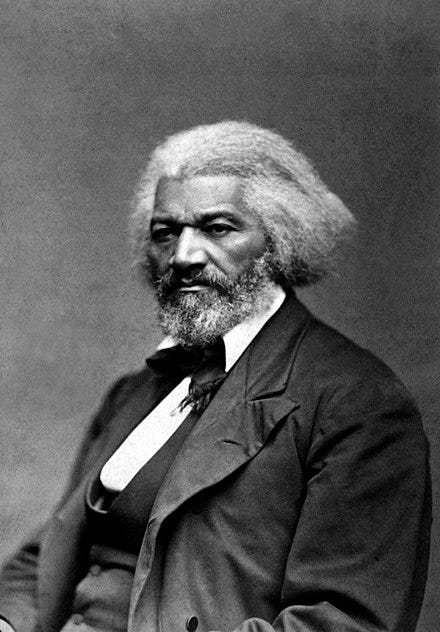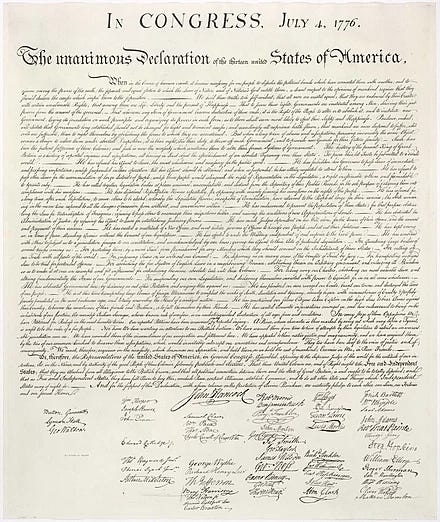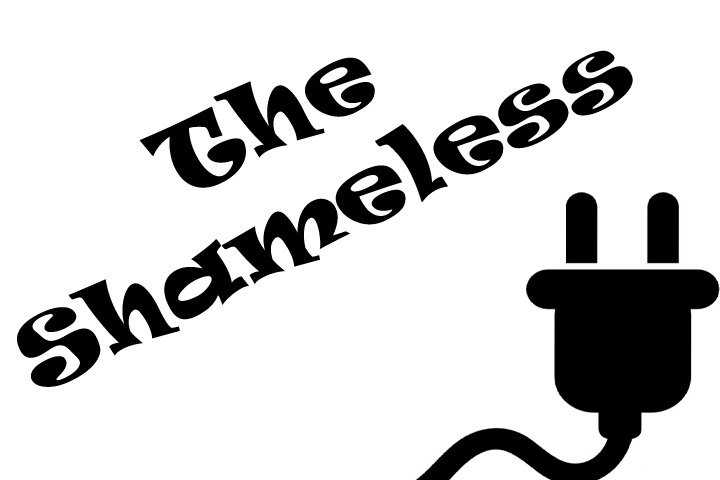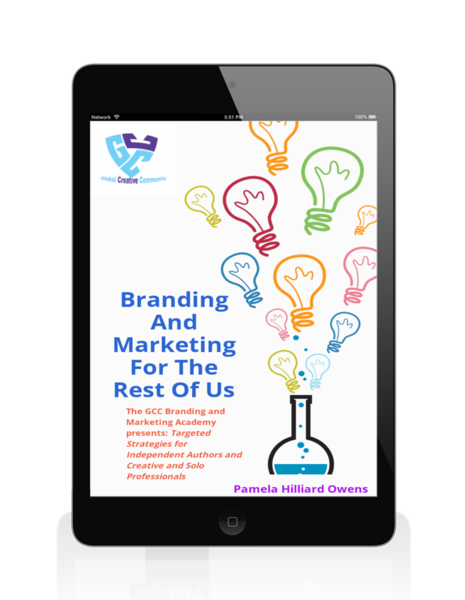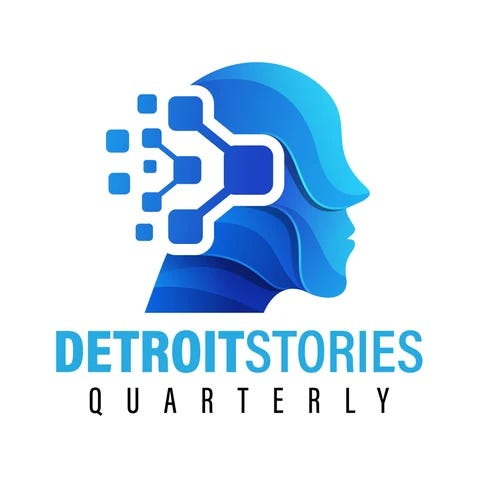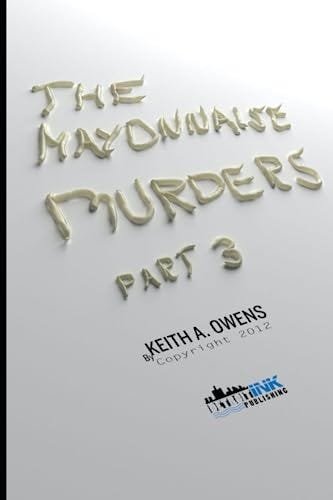What to the Slave is the Fourth of July?
Frederick Douglass explains why the celebration of July 4th is not the same for all of us.
Frederick Douglass in 1879
Issue #356: American History July 4, 2023
Today in America, July 4 is celebrated as "Independence Day," and is one of the official holidays that is celebrated on the exact day every year, instead of changing to be celebrated on the closest Monday to the actual date.
The Declaration of Independence
The "Unanimous Declaration of the thirteen United States of America" is the founding document of the United States. It was adopted on July 4, 1776, by the Second Continental Congress meeting at the Pennsylvania State House in Philadelphia. The declaration explains why the thirteen colonies regarded themselves as independent sovereign states no longer subject to British colonial rule.
For Black people in America, especially since Juneteenth is now an officially recognized federal holiday, July 4 Independence Day is a conundrum. The "American Experiment" was never meant for us; the 1787 Constitution considered us to be just 3/5 of a person. Even to this day, we have to continuously fight for the rights that are supposed to belong to all Americans.
On the other hand, we have fought for this country in every war ever since Crispus Attucks, a Black man who was a sailor and a stevedore, was the first person killed in the Boston Massacre, and as a result, the first American killed in the American Revolution.
“We Are Speaking,” through we publish seven days a week, is financially supported by our paid subscribers and by investments in the products and services offered by the Global Creative Community Branding and Marketing Academy. Please make sure to view and act on the important information at the end of this article to help support and grow “We Are Speaking.” Thank you!
Frederick Douglass and Independence Day
Frederick Douglass was an escaped slave who was also a social reformer, abolitionist, orator, writer, and statesman. He also founded the American Equal Rights Association.
On July 5, 1852, Frederick Douglass gave a keynote address at an Independence Day celebration and asked, “What to the Slave is the Fourth of July?” His speech, given at an event commemorating the signing of the Declaration of Independence, was held at Corinthian Hall in Rochester, New York. It was a scathing speech in which Douglass stated, “This Fourth of July is yours, not mine, You may rejoice, I must mourn.”
In his speech, Douglass acknowledged the Founding Fathers of America for their commitment to “life, liberty, and the pursuit of happiness:”
“Fellow Citizens, I am not wanting in respect for the fathers of this republic. The signers of the Declaration of Independence were brave men. They were great men, too, great enough to give frame to a great age. It does not often happen to a nation to raise, at one time, such a number of truly great men. The point from which I am compelled to view them is not, certainly, the most favorable; and yet I cannot contemplate their great deeds with less than admiration. They were statesmen, patriots, and heroes, and for the good they did, and the principles they contended for, I will unite with you to honor their memory.”
After that acknowledgment of the positive attributes and contributions of the Founding Fathers, many of whom were slaveholders themselves, Douglass went to speak truth to power:
“Fellow citizens, pardon me, allow me to ask, why am I called upon to speak here today? What have I, or those I represent, to do with your national independence? Are the great principles of political freedom and of natural justice, embodied in that Declaration of Independence, extended to us? and am I, therefore, called upon to bring our humble offering to the national altar, and to confess the benefits and express devout gratitude for the blessings resulting from your independence to us?”
“Would to God, both for your sakes and ours, that an affirmative answer could be truthfully returned to these questions! Then would my task be light, and my burden easy and delightful. For who is there so cold, that a nation’s sympathy could not warm him? Who so obdurate and dead to the claims of gratitude, that would not thankfully acknowledge such priceless benefits? Who so stolid and selfish, that would not give his voice to swell the hallelujahs of a nation’s jubilee, when the chains of servitude had been torn from his limbs? I am not that man. In a case like that, the dumb might eloquently speak, and the 'lame man leap as a hart.
"But such is not the state of the case. I say it with a sad sense of the disparity between us. I am not included within the pale of glorious anniversary! Your high independence only reveals the immeasurable distance between us. The blessings in which you, this day, rejoice, are not enjoyed in common. The rich inheritance of justice, liberty, prosperity, and independence, bequeathed by your fathers, is shared by you, not by me. The sunlight that brought light and healing to you, has brought stripes and death to me. This Fourth of July is yours, not mine. You may rejoice, I must mourn.”
- Frederick Douglass, July 5, 1852
As racism and sexism continues in this country, and as fascism and authoritarianism continue to rise, this speech, the most famous given by Frederick Douglass, explains why for many Black Americans, celebrating Independence Day is harder than it is for others.
Let us know your thoughts about what new information you learned in the comments or in the Substack Notes feature.
You can always leave any questions in the comments or email us.
You can also receive up to six months of a paid subscription for referring people to us with the Share Button or the Refer Button.
This article is free to access for 1 week after publication. Please consider becoming a paid subscriber for $5/month or less to access all of the articles and other benefits.
This is your chance to support everything Keith and Pam do. We appreciate you!
Purchase and download your copy of the “Branding And Marketing For The Rest Of Us” eBook for Independent Authors and Creative and Solo Professionals and other valuable eBooks.
Enroll in one of the 6-course bundles designed especially for you: “Author and Book Marketing” and/or “Essential Creative Marketing.”
Purchase your copies of “Detroit Stories Quarterly” issues.
Purchase your copies of “The Mayonnaise Murders” Parts 1, 2, and 3
What else do Keith and Pam do?
Where else can you find us?
Click the link below to learn everything you need to know and review everything we offer for independent writers and creative and solo professionals.




